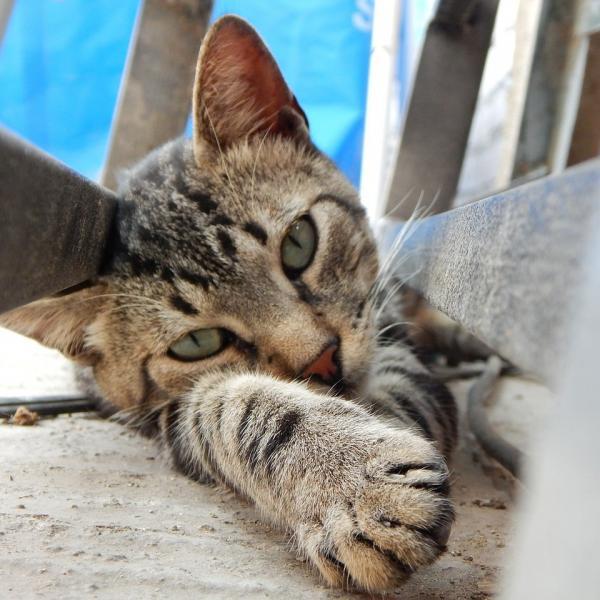Feline AIDS



See files for Cats
If you have a cat, you will know that these pets are very special. To take care of your faithful companion it is important that you know which diseases they can suffer from. AIDS in cats is one of the diseases, along with feline leukemia, that is greatly affecting the cat population. However, even if you do not have access to a vaccine, you can treat it effectively.
Although this can be a daunting time, do not panic or jump to conclusions straight away. AnimalWised are here to detail everything about feline AIDS - their causes, symptoms and treatment.
FIV - The feline immunodeficiency virus
Known as VIF, the immunodeficiency virus in cats is a lentivirus that only attacks cats. Although it is the same disease that affects humans, it is produced by a different virus, so AIDS in cats does not spread to humans.
FIV directly attacks the immune system, destroying T-lymphocytes. This results in the animal being vulnerable to other diseases or minor infections. But, it is important to say it can lead to death.
Detected in time, feline AIDS is a disease that can be controlled. An infected cat, who follows the proper treatment, can have a long and dignified life.
Transmission and spread of AIDS in cats
For our pet to get AIDS they need to be in contact with the saliva or blood of another infected cat. In principle, it is only known that feline aids are transmitted through bites, so stray cats are the most likely to carry the virus.
Unlike the disease in humans, it has not been proven that AIDS in cats is transmittedsexually. But, during the management of an infected mother or even if pets share a drinker or feeder.
If your cat has always been at home you do not have to worry. However, if they are not castrated and go out at night, it is best that you do a blood test to check that everything is fine. Remember that cats are territorial which can lead to biting.

Symptoms of Feline Aids
As in humans, a cat infected with the AIDS virus can live years without presenting characteristic symptoms or until the disease is detected.
However, when the destruction of T-lymphocytes begins to deplete the immune system, small bacteria and viruses that our pets face daily will start to wreak havoc on the animal's health. This is when the first symptoms may appear.
The symptoms of AIDS in most common cats that may appear months after the infection are:
- Fever
- Loss of appetite
- Their fur lacks shine
- Gingivitis
- Stomatitis (inflamed and sore mouth)
- Recurrent infections
- Diarrhea
- Inflammation of connective tissue
- Progressive weight loss
- Spontaneous abortions and fertility problems
- Mental deterioration
In general, the main symptom of a cat with AIDS is the appearance of recurrent diseases. So it's important to watch for the sudden onset of common diseases. Or if your cat relapses steadily into health problems that seem unimportant at first.

Treatment for cats with immunodeficiency
The best cure is prevention, however, although the AIDS disease in cats has no vaccine, with proper care an infected pet can have a happy life.
To prevent your cat from becoming infected with the AIDS virus, remember to control your visits to the outdoors. Always avoid fights with stray cats and do a checkup at least once a year. Even more frequently if they come home with some scratch or bite. If this was not enough and your cat is infected you have to work on strengthening their immune system.
There are antimicrobial drugs that can help control infections or bacteria that attack the animal. We must keep in mind that these treatments must be carried out constantly, otherwise our feline friend may develop new infections. There are also anti-inflammatory drugs that will help control diseases such as gingivitis and stomatitis.
As well as medication, you should also alter your usual feeding routine for cats with AIDS. It is recommended that their diet be high in calories, to fight against the deterioration of the infected animal.
No treatment acts directly on the FIV itself. What we can do to help our pet and give them a decent life is to keep any diseases at bay that may attack while their immune system is weak.
What else should I know about feline AIDS?
Life expectancy: It is important that you keep in mind that the life expectancy of a cat with AIDS is not easy to predict. It will depend on how their immune system responds to the attack of diseases. When we speak of a dignified life, we mean that a pet with a feline aids, can live with dignity and minimal care. Even when it seems that their health is improving, you should be very attentive to aspects such as weight and fever.
One of my cats has AIDS but the others do not: If cats do not fight each other there is no possibility of contagion. Remember that feline AIDS is only transmitted through bites. However, as this is somewhat difficult to control, we recommend that the infected cat be isolated, as if it were any other infectious disease.
My cat has died of AIDS, is it safe to carry a new one?: Without the carrier, FIV is very unstable and can not survive more than a few hours. In addition, feline AIDS is only transmitted through saliva and blood, and without an infected cat that bites, contagion to a new pet is very unlikely.
As with any other infectious disease, we recommend some preventive measures:
- Disinfect or replace all belongings of the deceased cat
- Disinfect carpets
- Vaccinate the new pet against the most common infectious diseases
Can a cat with AIDS infect me?: No, feline AIDS does not attack humans. A cat infected with AIDS can never infect a human even by biting them. Although it is the same disease, FIV is not the same virus that infects humans. In this case we are talking about HIV, which is the human immunodeficiency virus.

If you would like to read more similar articles, we recommend you enter our Infectious diseases section.
This article is purely informative. AnimalWised does not have the authority to prescribe any veterinary treatment or create a diagnosis. We invite you to take your pet to the veterinarian if they are suffering from any condition or pain.
If you want to read similar articles to Feline AIDS, we recommend you visit our Infectious diseases category.






 I brought home a feral cat that has lived through two hard winters competing with 13 other cats. Eating with a really painful nasty, smelly mouth. Vet check came up him having the cat Aids. He eats really good most the time. I give him a bowl of kitty milk now and then. He gets grass if he wants it (he licks dirt also). Regular can food but strangely seems to love the hard kibbles, I'm thinking he swallows everything whole. He never misses his litter box but all he does is curl up and sleeps. Very little physical activity. I put him in the sun when it comes out but winter is here now an all he gets is sun that comes from the window. What can I do to get his mouth cleared up, it's very painful for him if I try to clean off the drainage? Please I need help with this issue. He doesn't deserve to be put down if he still purrs, eats an gets to his litter box.
I brought home a feral cat that has lived through two hard winters competing with 13 other cats. Eating with a really painful nasty, smelly mouth. Vet check came up him having the cat Aids. He eats really good most the time. I give him a bowl of kitty milk now and then. He gets grass if he wants it (he licks dirt also). Regular can food but strangely seems to love the hard kibbles, I'm thinking he swallows everything whole. He never misses his litter box but all he does is curl up and sleeps. Very little physical activity. I put him in the sun when it comes out but winter is here now an all he gets is sun that comes from the window. What can I do to get his mouth cleared up, it's very painful for him if I try to clean off the drainage? Please I need help with this issue. He doesn't deserve to be put down if he still purrs, eats an gets to his litter box.




